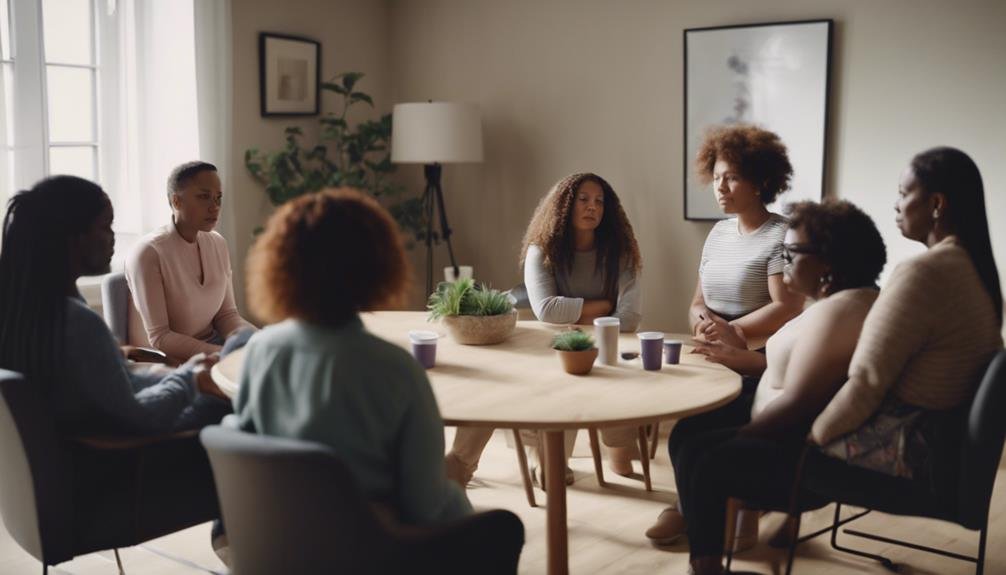You’re on the right path to healing with these 5 essential early intervention resources for domestic abuse survivors: Emergency Shelters for immediate safety and support. Legal Aid for managing legal processes and protecting your rights. Counseling Programs for healing in a safe space. Safety Planning Resources to create personalized strategies for staying safe. Support Groups for a sense of community and empowerment. Each resource plays an important role in your journey towards healing and reclaiming control of your life.
Key Takeaways
- Emergency shelters provide immediate safe housing and supportive services.
- Legal aid services offer free legal support for protective orders and custody.
- Counseling programs offer professional support for healing and coping.
- Safety planning resources help survivors identify risks and create escape plans.
- Support groups provide emotional support and community for survivors to heal.
Emergency Shelter Options
Explore the diverse range of emergency shelter options available to provide immediate and safe housing for domestic abuse survivors in crisis situations. These emergency shelters not only offer a secure place to stay but also provide a range of supportive services for victims, including children and young individuals.
Services for victims at these shelters go beyond just accommodation. They encompass confidential support, counseling, and access to essential resources that aid survivors in rebuilding their lives. Trained staff members are on hand to offer legal services, job skills education, and assistance with transportation needs.
For survivors with children and young ones, these emergency shelters offer specialized care. Children and young individuals can benefit from services like case management, support groups, and help with school-related concerns.
Even in rural areas, emergency shelter options exist to ensure that all individuals have access to these crucial support services. If you or someone you know is in need of immediate assistance, reaching out to these emergency shelters can provide a lifeline in times of crisis.
Legal Aid Services
Legal aid services provide essential assistance to domestic abuse survivors facing legal challenges by offering free or low-cost legal support. These services are critical for victims seeking help with protective orders, child custody issues, divorce proceedings, and other legal matters related to domestic abuse. Legal aid organizations have dedicated attorneys and legal professionals who specialize in domestic violence cases, understanding the unique needs of survivors during such challenging times.
Survivors can access these important legal aid services through local legal aid organizations, domestic violence shelters, or via referrals from hotlines or social service agencies. These services play a significant role in helping survivors navigate the legal system, protect their rights, and seek justice and safety from their abusers.
Counseling Programs
Getting through the emotional aftermath of domestic abuse can be overwhelming, but counseling programs offer survivors a safe and supportive environment to begin their healing journey. Children who are victims of domestic violence can greatly benefit from accessing these resources. Counseling programs provide survivors with professional support and guidance to help them process their experiences, heal from trauma, and develop healthy coping mechanisms.
Through counseling, survivors can also create a safety plan and feel empowered to make informed decisions about their future. It’s essential to note that survivors can access counseling services in person or through virtual platforms, offering added convenience and flexibility. These programs prioritize confidentiality and are tailored to meet the unique needs of each individual, ensuring personalized healing and empowerment.
Safety Planning Resources
Understanding the significance of safety planning resources is crucial for domestic abuse survivors in creating a personalized strategy for staying safe.
The Department of Justice emphasizes the importance of early intervention to effectively address domestic abuse.
Safety planning resources offer practical tips on safeguarding oneself at home, work, and in public spaces. These resources help survivors identify potential risks, develop an escape plan, and know how to seek help during emergencies.
By utilizing safety planning resources, survivors can shield themselves and their children from further harm, empowering them to reclaim control over their safety and well-being in challenging situations.
Support Groups

In seeking healing and understanding after experiencing domestic abuse, turning to support groups can provide an essential source of empathy and encouragement. These groups offer a safe and understanding space for survivors to share their experiences and receive emotional support from individuals who’ve walked similar paths.
By participating in support groups, survivors can feel a sense of community and find solace in knowing they aren’t alone in their journey towards healing.
Moreover, support groups provide a platform for survivors to gain valuable insights, coping strategies, and encouragement to navigate the complexities of recovering from domestic abuse. With trained facilitators guiding discussions, participants can engage in conversations that promote respect, confidentiality, and empowerment.
Joining a support group can help survivors feel less isolated, more empowered, and better equipped to move forward from the trauma of domestic abuse. Embrace the opportunity to connect with others who understand and validate your experiences, as you take steps towards healing and reclaiming your strength.
Frequently Asked Questions
Are There Programs Specifically Tailored for Lgbtq+ Domestic Abuse Survivors?
If you’re an LGBTQ+ domestic abuse survivor, there are programs tailored for you. LGBTQ+ support groups offer understanding. Legal protections safeguard your rights. Community resources provide help. You’re not alone; support is available.
How Can I Access Financial Assistance for Housing After Leaving an Abusive Situation?
When seeking financial aid for housing post-abuse, explore housing grants, emergency shelters, and interim housing options. Contact local shelters, community organizations, and government agencies for guidance and support in accessing these resources.
Is There Support Available for Survivors With Disabilities or Special Needs?
If you have disabilities or special needs, there are resources to support you. Accessibility accommodations, sensory-friendly services, and adaptive technology can help. Specialized counseling, inclusive therapy, and support groups offer understanding and guidance.
Can I Receive Childcare Assistance While Attending Counseling or Legal Appointments?
You can receive childcare support to help while attending counseling or legal appointments. Many organizations offer this assistance to guarantee accessibility for survivors. Don’t hesitate to inquire about these services; they are here to help you.
Are There Resources for Immigrant Survivors Facing Language Barriers or Immigration Concerns?
When facing language barriers or immigration concerns, remember there are resources available that prioritize cultural sensitivity and provide language access. Reach out for community resources, legal support, and advocacy assistance tailored to immigrant survivors like you.
Conclusion
In your journey to healing from domestic abuse, remember that these early intervention resources are like a sturdy lifeboat in a stormy sea. They can provide you with shelter, guidance, and support as you navigate through the challenges ahead.
Lean on them, trust in them, and let them be your guiding light towards a brighter future. You aren’t alone in this battle, and with the right tools and resources, you can find safety and peace once again.







